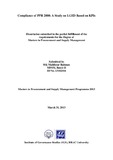| dc.contributor.advisor | Islam, Dr. Md. Zohurul | |
| dc.contributor.author | Rahman, Md. Mahfuzar | |
| dc.date.accessioned | 2013-06-18T10:14:53Z | |
| dc.date.available | 2013-06-18T10:14:53Z | |
| dc.date.copyright | 2013 | |
| dc.date.issued | 2013-03-31 | |
| dc.identifier.other | ID 13182016 | |
| dc.identifier.uri | http://hdl.handle.net/10361/2676 | |
| dc.description | This dissertation report is submitted in partial fulfillment of the requirements for the degree of Masters in Procurement and Supply Management, 2013. | en_US |
| dc.description | Cataloged from PDF version of thesis report. | |
| dc.description | Includes bibliographical references (page 41 - 42). | |
| dc.description.abstract | Transparency, efficiency, accountability, competitiveness, equitable treatment and free & fair
competition are essential to be ensured in the procurement using public funds. In Bangladesh,
these could not be ensured earlier due to a lack of proper rules and regulation. To streamline
the public procurement activities, the Government of the People’s Republic of Bangladesh
has enacted Public Procurement Act (PPA) 2006 and thereafter issued Public Procurement
Rules (PPR) 2008. Since then government agencies are bound to abide by the Act and Rules
very strictly in their procurement activities. The Central Procurement Technical Unit (CPTU)
of the Implementation Monitoring and Evaluation Division (IMED) is continually monitoring
the compliance of PPA 2006 and PPR 2008 by the target agencies in the light of 45
predetermined Key Performance Indicators (KPI).
Among the four target agencies, LGED is the largest in terms of budget allocation against the
projects in the Annual Development Programme (ADP). It is generally said that a total of
80% of ADP allocation are spent for procurement of goods, works and services which are
administered by PPR 2008. Thus, it seems to be a good consideration to have a look at the
compliance issues of PPR 2008 in LGED’s procurement activities.
The research has been designed under the questions if LGED is following PPR 2008
completely or not; and if not, then the causes behind that. The main objectives of the present
study are to find out the extent of compliance of PPR 2008 by LEGD and to find out the gap
of compliance and scope of improvement for implementation. The related literatures and
reports, particularly from LGED and SRGB, have been thoroughly reviewed before
conducting the main research work. The key findings of these reports have been compared
and analyzed which helped to draw important conclusion of the study.
A questionnaire survey was carried out to collect primary data from different stakeholders
related to procurement activities of LGED. For in-depth study on the compliance issues of
PPR 2008, eight different projects were studied carefully to collect the qualitative data too. In
addition to survey, key informant interviews have been conducted to get the perceptions of
few senior officers of LGED and IMED. The study result shows a clear adherence to the rules of PPR 2008 in LGED in carrying out
most of the compliance related KPIs. The individual consultant’s reports as well as SRGB’s
report also show a clear indication of compliance of PPR 2008 by LGED. Among the 11
different compliance issues, it has been revealed that respondents replied in an overall
positive manner as satisfactory against 7 issues. For other 4 issues namely submission of
report by the TEC, imposition of liquidated damage, days taken to release payment, and
interest for delayed payment are not satisfactory and a clear improvement is required in these
areas. Also, the perceptions of the respondents regarding the issue of releasing payment need
to investigate more cautiously as there are ambiguity among the findings of present study,
individual consultant’s reports and SRGB’s report. However, the scenario is more or less
similar in other target agencies
For improvement of these situations, four specific recommendations have been drawn. These
are (i) to induce a mechanism for ensuring that TER is directly submitted to the contract
approving authority as per Rule 36(3) of PPR 2008, (ii) to ensure the timely payment to the
contractors, tender should be floated only after availability of sufficient fund, (iii) a liquidated
damage clause and (iv) payment of interest in case of delayed payment should be considered
carefully to protect the interests of both the parties. | en_US |
| dc.description.statementofresponsibility | Md. Mahfuzar Rahman | |
| dc.format.extent | 58 pages | |
| dc.language.iso | en | en_US |
| dc.publisher | BRAC University | en_US |
| dc.rights | BRAC University dissertation reports are protected by copyright. They may be viewed from this source for any purpose, but reproduction or distribution in any format is prohibited without written permission. | |
| dc.subject | Procurement and supply management | |
| dc.title | Compliance of PPR 2008 : a study on LGED based on KPIs | en_US |
| dc.type | Dissertation | en_US |
| dc.contributor.department | Institute of Governance Studies, BRAC University | |
| dc.description.degree | M. Procurement and Supply Management | |

